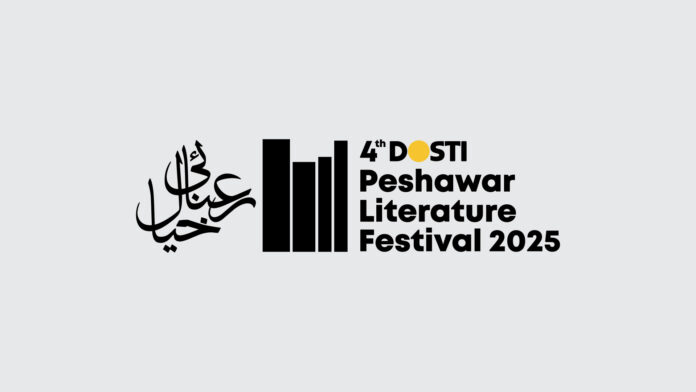- Advertisement -
PESHAWAR, Feb 19 (APP):Khyber Paktunkhwa Child Protection and Welfare Commission and the University of Peshawar in collaboration with UNICEF organized a panel discussion focused on “Protecting Every Child’s Rights: Why Youth Matters” at the 4th DOSTI Peshawar Literature Festival.
This Literature Festival served as a dynamic platform to explore the intersection of literature, social responsibility, and youth activism, with a strong focus on child protection and rights advocacy.
Literature brings people together to reflect on important social issues, and within this intellectual space, students and experts came together for a thoughtful discourse around the role of youth as key stakeholders in shaping a safer society for children
This discourse brought together academics, policymakers, child rights practitioners, and students.
The debate focused on the need to protect children’s rights and the role of youth in advancing child protection efforts and becoming thought leaders and prospective workforce in various sectors committing to keep child rights at the center of their ambitions and professional service.
The panel brought together distinguished experts, including Dr Basharat Hussain, Professor and Chairman, Department of Criminology, Peshawar University; Sohail Ahmad, Child Protection Specialist, UNICEF KP; Muhammad Ijaz Khan, Chief Protection Officer KPCP&WC; and Rehma, Secretary Youth and Adolescent Affairs at the Community Based Child Protection Committees (CBCPCs), District Khyber.
Rehma shared her first hand experience as an adolescent leader in the CB-CPC Khyber, discussing the awareness raising initiatives she has conducted in local communities, including sensitization campaigns on child rights, child labor, and early marriages, and access to education.
Dr Basharat Hussain spoke about the critical role of academic institutions in fostering awareness and expertise on child rights and human rights issues.
He noted that while several disciplines are directly linked to child protection, more should be done to encourage interdisciplinary studies that integrate child protection into multiple academic domains.
Specialized courses focused on child rights, juvenile justice, and social work could be introduced, and for experiential learning opportunities, students can be engaged in internships and fieldwork with child protection organizations.
Ijaz highlighted that the government and the Khyber Pakhtunkhwa Child Protection and Welfare Commission recognize youth as a critical force in child protection.
He stressed young people to actively engage with the child protection system in KP and to leverage social media and technology to raise awareness about child rights violations.
Sohail Ahmad spoke about the United Nations Convention on the Rights of the Child (UNCRC) and Sustainable Development Goals (SDG) as guiding frameworks for the government, academia and change makers.
He highlighted the intersection of social injustices, inequalities and violation of child rights and the need for bringing society, policy makers and change advocates together.
He also highlighted on UNICEF’s efforts to strengthen pre-service training of the students in various disciplines and bridge academic research for evidence informed policy making and better service delivery to children and their families.
He advocated to youth for making child rights at the center of their research and utilizing their potential as change advocates and invited them to connect with the child protection system in KP as volunteers and change makers.
The panelists collectively stressed the need for a multisectoral approach, bridging academia, policy, and practice to strengthen child protection systems with youth at the center.
The session concluded with call to action, encouraging students to engage in child protection initiatives at the university and communities and to leverage academic resources to contribute to policy research and advocacy.
A Pledge Wall was set up, allowing students to articulate their commitment to child protection by writing down personal pledges on how they intend to contribute to the cause.
Participants also had the opportunity to sign up as volunteers for ongoing child protection initiatives with the KPCP&WC and Social Welfare Department.
As part of the Children’s Festival held on the same day, additional sessions and creative engagements provided participants with a deeper understanding of child protection challenges and solutions.
A session on “Healing Streets: Integrating MHPSS for the Wellbeing of Street Children” was led by Clinical Psychologist Kainat Farooqi from the Social Welfare Department, exploring MHPSS strategies tailored for street children, addressing their vulnerabilities and the need for comprehensive interventions.
The session also provided an opportunity for direct engagement with children and youth, discussing how mental health services can play a transformative role in their well-being.
Facilitated by artist Lali Zarafsha from the Social Welfare Department, a “Creative Corner: Campus Up for Child Rights” session engaged university students in discussions around how campuses can serve as hubs for child protection initiatives, with creative expression being a powerful tool for awareness, activism, and social transformation.
The Additional Secretary Social Welfare Department Umara Khan appreciated the DOSTI Peshawar Literature Festival for providing an intellectual platform where child protection was integrated into literature, art, and social dialogue.
He said that young people must transition from awareness to action, using their education, networks, and creativity to drive positive change.
He affirmed the Social Welfare Department’s commitment to creating more opportunities for youth participation in child protection efforts.
Throughout the 10-day festival, child protection efforts were showcased through dedicated stalls, providing attendees insights into ongoing initiatives of KP government where communication materials on child rights were displayed and shared.
The interactive exhibits attracted a diverse audience including students, parents, educators, and policy makes offering a valuable opportunity to engage with child protection practitioners and explore advocacy tools for strengthening child safety measures.
The 4th DOSTI Peshawar Literature Festival 2025 reaffirmed that child protection is not just a policy matter but a shared social responsibility.
The event successfully bridged intellectual discourse with actionable engagement, inspiring youth to take ownership and be thought leaders for making child rights at the center of their activisms, academic research and ambition.

